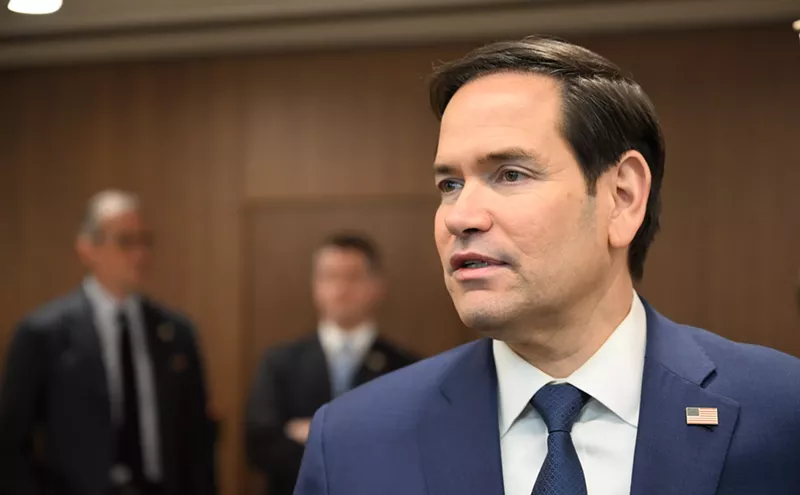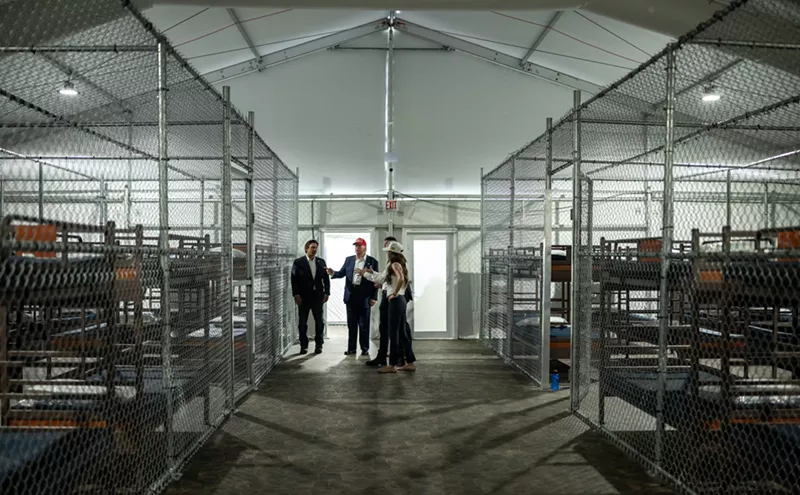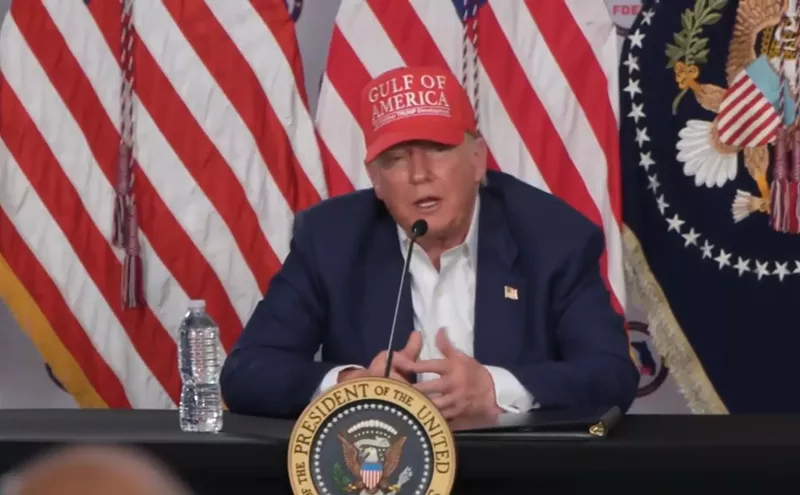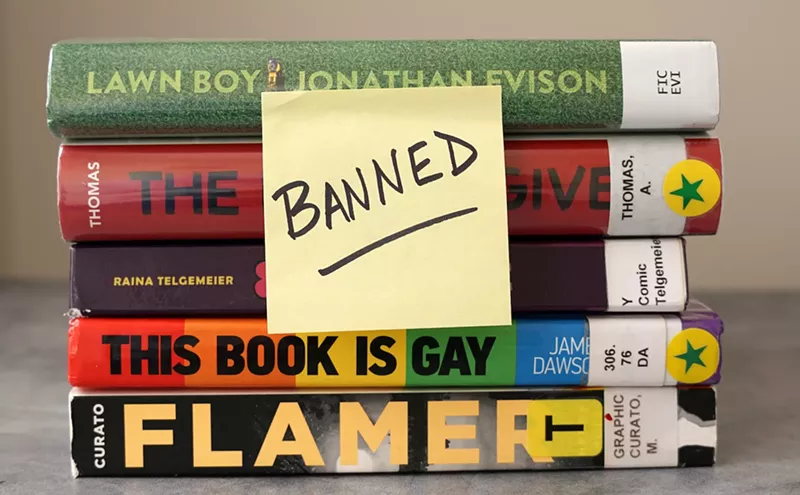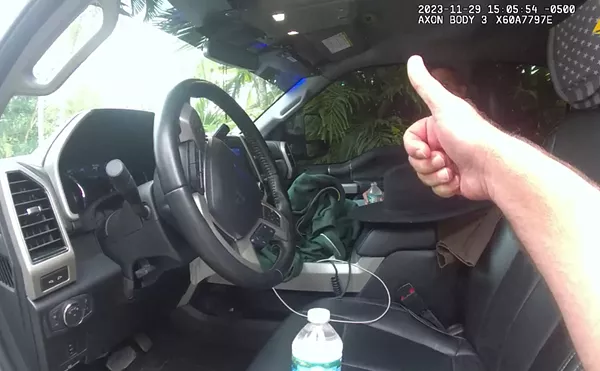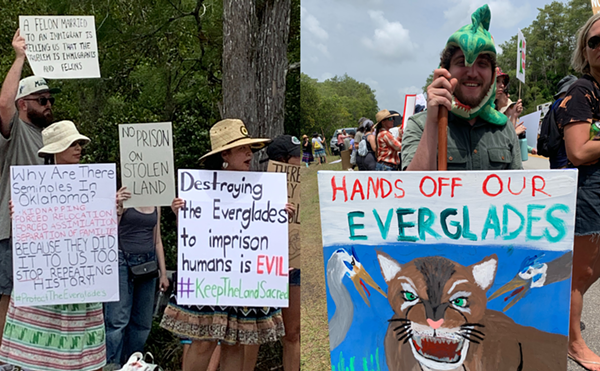January 2, 2003: Under a bright blue sky, John Timoney stood in front of city hall and formally accepted the job as Miami's police chief.
He was taking over a deeply troubled department — that very week, 11 officers would stand trial for fabricating evidence and planting guns. But the tough-talking Irishman with policing roots in the Bronx didn't seem fazed. If anyone could clean up the department, it was Timoney. He had sorted out significant problems as a top cop in both Philadelphia and New York.
One story had it that during the 2000 Republican National Convention in Philadelphia, he rode his patrol bicycle into a crowd of protesters — and the unruly mob smashed it over his head. "It was a knock-down, drag-out fight," the Miami chief said, laughing. "Unfortunately I picked the biggest guy. I should have picked the smaller guy."
The story was classic Timoney: It showed his strength, bravado, and dry wit. It was also a lie — but more on that later.
Mayor Manny Diaz, City Manager Carlos Gimenez, and others lapped up Timoney's stories; he had star power. Author Tom Wolfe was his friend. So was New York's Cardinal John J. O'Connor. Timoney had lectured at Amherst College on Dostoyevsky's Crime and Punishment. He had even been called "America's Best Cop" by Esquire in 2000.
So that day at city hall, he addressed his new department's problems head-on: "Every now and again police departments bring shame and embarrassment on their city. Their negative actions reflect negatively on the city. They bring unwanted national and international attention.... This policing business is very important, and it is important that it be done right for the city and for its citizens, but also for the free, open democratic society we cherish. In the process, we must strive to regain and maintain public trust and confidence so that the average citizen can point to the Miami Police and proclaim proudly: 'These are our police officers; this is our police department.'"
Everyone in the audience applauded wildly.
Exactly one week later Timoney would high-tail it to Washington, D.C. He'd spend three days at — where else? — the Watergate Hotel while attending a policing conference. Cost to Miami taxpayers: $1043.
That trip was a harbinger.
There are many reasons why John Timoney should be fired. He has trampled civil rights, from the 2003 Free Trade Area of the Americas protests to the soon-to-be-placed video cameras throughout downtown. He accepted a free Lexus SUV from a local auto dealer and then lied about it. And, according to the police union, he allowed subordinates to manipulate crime statistics to make it appear he's doing a good job.
There's also this: City cops hate him. On September 4, 520 of 650 police union members cast no-confidence votes against the chief.
All of that has been publicized. But until now, no one has talked about perhaps his greatest sin. He's the city's best-paid employee — with a compensation package worth more than $214,000 per year — but he's not around much. During four years and nine months in office, Timoney has been out of town for at least 138 days — not counting vacation. During his 30 jaunts to places like Belfast and Los Angeles, he has stayed in the Wilshire Grand and the Mandarin Oriental. Cost to taxpayers: more than $28,000.
In 2005, the year County Commissioner Art Teele shot himself in the Miami Herald's lobby and Wilma ravaged Miami, Timoney was on the road for one of every five workdays. In 2006, while killings in the city skyrocketed by 41 percent, he took off for 30 days.
The information is documented in 200 pages of reimbursement forms, hotel bills, and other receipts provided by the city in response to public records requests. And there might be much more. Trips to Iraq to study security, to tour Guantánamo, and to Oklahoma for a speech to a small-town police force aren't included in the city file. And Timoney is not required to report all absences to his superiors.
The chief didn't respond to repeated requests via telephone and e-mail seeking comment for this story. His boss, City Manager Pete Hernandez, defends the prodigious travel. "The chief is very well received nationally, and he's a very good representative of the city," says Hernandez. "He's done a good job elevating the level of respect given to the city of Miami."
Former Miami Police Chief Ken Harms has a different take: "Outrageous. Who the hell was it that was fiddling while Rome burned? How does it benefit policing in the city of Miami? This is about enhancing Timoney's big-shot reputation."
In 2003, two months after Timoney's trip to Watergate, he was on the road again. This time it was Orlando, for a Commission on Accreditation for Law Enforcement Agencies meeting. He spent $828.
The chief seemed to be doing everything right back then, so nobody complained about the absence. Soon after taking the job, he tightened police use-of-force policies, fired some officers, and moved the internal affairs department out of police headquarters to ensure fair investigations.
But then came May 2003. "Fuck Angel Gonzalez," he said at Dinner Key after the Miami commissioner demanded some information. Gonzalez sent a letter to City Manager Joe Arriola, who had become Timoney's boss in March 2003. "I view his behavior as disgraceful conduct unbecoming of a police chief," Gonzalez wrote.
City Commissioner Tomás Regalado, who had supported Timoney's appointment, was also unimpressed: "I had very high hopes, but I have not seen any changes at all."
Timoney didn't simply stand around and take that criticism. In May he announced a Department of Defense-sponsored sojourn to Iraq to help set up a police academy. That trip would be canceled because "the State Department was unable to work out the logistics," according to a spokesman. But in October he left for Philadelphia, the city where he had served four years as police commissioner. He spent $2641 attending the International Association of Chiefs of Police annual meeting for six days while staying at the Marriott in the city's center.
The defining event of Timoney's tenure, the Free Trade Area of the Americas (FTAA) summit, came to Miami November 20. Police were on guard because of the massive riots that had taken place in Seattle during a 1999 World Trade Organization meeting and demonstrations during the 2000 Republican National Convention in Philadelphia, when Timoney was police commissioner there. Hundreds of people were arrested at both. "Timoney's strategy during the RNC was to arrest as many people as possible, look good in front of the TV cameras, and deal with the Constitution later," commented Kris Hermes, spokesman for a group that helped defend many of the demonstrators.
From FTAA's start, Timoney locked down the city's center. Then he dispatched 2500 officers in riot gear against about 12,000 protesters. The cops used rubber bullets, shields, batons, concussion grenades, and stun guns. The "rough start," Timoney would later explain, was needed because some demonstrators didn't have permits. Sixty people were taken into custody; many were beaten by cops. At one point, Timoney jumped off of his patrol bicycle and yelled at a protester: "Fuck you! You're bad!" Nineteen-year-old Edward Owaki of Connecticut was linking arms with other protesters on Biscayne Boulevard when police barreled into the crowd and pinned him to the ground. He suffered a severe head injury and was hospitalized for a week.
Free speech advocates were horrified. One editorial writer from the St. Petersburg Times said, "The show of force would have made a Latin American dictator blush."
Timoney responded with typical sensitivity. His officers "demonstrated a tremendous amount of restraint," he said.
Then he did what he knows best. He split town. On December 8, less than three weeks after the last protester was dispatched, he took an eight-day trip to London and Belfast for the U.S.-U.K. Police Chiefs Conference. He stayed at the Hastings Culloden Hotel in Belfast, which overlooks the coast and 12 acres of "beautiful, secluded gardens," according to its Website. The hotel's slogan: "Built for a bishop ... Fit for a king."
Amount spent on travel in 2003: $6779
Days away from the city: 21
Fallout from the FTAA riots continued in 2004. Accountants totaled costs for security around $23.9 million. The American Civil Liberties Union received 150 complaints alleging police abuse and filed six lawsuits on behalf of protesters in federal court. (They are all still pending.) The city settled for $180,000 with an independent filmmaker named Carl Kessler after he was injured by a police beanbag fired into his face. And the Miami Civilian Investigative Panel issued a report criticizing cops for profiling and unlawfully searching protesters.
Yet the chief stood by his claim that his handling of the protests was a "success." And he was right — at least if you consider his frequent-flyer account. During at least half of the 26 trips Timoney took after the FTAA summit, he was called up to discuss what became known as "The Miami Model" of crowd control.
In April that year, the chief was embarrassed when a Philadelphia judge dismissed the case against "The Timoney Three," who had been arrested during the 2000 GOP convention after one had allegedly thrown a bicycle at the chief. It was the story he told to local media while chuckling that first day on the job. Called to testify, Timoney couldn't identify his attacker. Worse, a video showed the trio had cooperated with police before taking a beating.
In early June the chief took a three-day trip to Newark to speak at a conference on "domestic security preparedness." It's unclear whether he was paid for that appearance or exactly what he spoke about. He was out of town for virtually all of the latter half of the month as well, traveling to Washington, D.C., for a Webcast on law enforcement use of force, and then jetting with Mayor Diaz to NYC for a Manhattan Institute forum. Next he and Diaz headed to Boston, where they stayed at the Sheraton for the U.S. Conference of Mayors. ("I guess he went with Manny Diaz just as a drinking buddy," Commissioner Regalado would later say.)
In November Timoney headed to Los Angeles for his second International Association of Chiefs of Police annual conference, at the city taxpayers' expense. He stayed at the Wilshire Grand for five nights. Cost: $1224. He didn't bill us for his $171 bar bill — though he submitted it with his travel records. The hotel bar, called Point Moorea, is described on its Website as a "unique upscale high-energy lounge styled after the popular tiki bars of the 1950s and '60s." On this trip, as most others, the chief received a fixed per diem of about $50 to $80 for food expense, depending on the city.
That same year Timoney came under fire from local black activists for keeping a black book of information on rappers and hip-hop artists (including Ja Rule, 50 Cent, and Jacki-O) who came to town for Memorial Day weekend celebrations. Music industry executives said the police were "spying" and using the book to discriminate against people of color. Timoney's response: He only intended it to keep police up-to-date on rap music's warring factions.
In December the peripatetic policeman made for San Diego, where he stayed for two days at the Paradise Point Resort and Spa (located on a private island complete with "tropical gardens" and "meandering lagoons"). He was there to attend the Police Executive Research Forum and to participate in a talk called "Critical Issues in Policing."
After all of that hard work, Timoney clearly needed sustenance. So he took his executive staff out to lunch at his favorite Miami restaurant, Gordon Biersch, according to the Miami Herald. He busted a purse snatcher during the revelry.
Amount spent on travel in 2004: $5090
Days away from the city in 2004: 23
The two hurricanes of 2005 didn't slow Timoney. That year he left Miami at least 10 times: Eight trips were reimbursed by the city, and two others — well, it's unclear who paid for those because they aren't reflected in city records.
Not that he did anything but work during those absences. On January 9 he stayed at the Grande Villas at World Golf Village in St. Augustine. According to the Website, it's a "country club-style vacation residence with every comfort and amenity." It's also located adjacent to the World Golf Hall of Fame. Timoney was there for the Florida Police Chiefs Association meeting.
A week later he attended a homeland security gathering in Washington, D.C., and in February he spent two days with Mayor Diaz in Key West at the Hilton for the U.S. Conference of Mayors. In May he visited Haiti for a few days to assess the police force, but taxpayers picked up only the $30 tab for the departure tax; the Haitian Government paid for his hotel and food.
In June he flew off on British Airways to Scotland for a Leadership in Counter Terrorism summit. He billed the city only for his $1161 airfare; someone else apparently paid for hotels and meals.
He went to Guantánamo Bay in July, according to press reports. (The trip doesn't show up in city records.) And in August he was a keynote speaker at a fundraising dinner for the Shawnee, Oklahoma Police Foundation (that trip isn't in the records, either — and it's not clear how many days he stayed). Then, just a few days after Hurricane Katrina knocked out power and created chaos in Miami, Timoney flew to New Jersey for three days to study closed-circuit television — it was a crime-fighting tool he was considering for the city's downtown area.
"Timoney has dealt a tremendous blow to our civil liberties," says Miami activist Max Rameau. "I think he would be the happiest on some team in Iraq, crushing people who he thinks are terrorists."
In September, Timoney went to a counterterrorism meeting in Belfast for 10 days, and three months later he attended a similar meeting in Boston. He should have stayed home. While the chief was out of town, two men in their twenties — Mike Fernandez and Sigfredo Garcia — were shot and critically wounded at a bus stop at NW 27th Avenue and West Flagler Street. The men said a shooter had stalked them on the bus and hounded them for nude photos of Fernandez's younger brothers.
Around that time, Timoney experienced family problems. His son Sean was arrested in New York. Police said the 25-year-old had tried to buy 400 pounds of marijuana from an undercover federal agent. The chief, who had not spoken with his only son for two years, at first didn't want to post bail, according to The New Yorker, which profiled the chief this past March. "Just let him rot in there," Timoney said of his son. "I don't give a shit." Eventually he put his Miami condo up as collateral for bail. It was especially painful because his daughter Christine had had heroin problems in the past.
As the year ended, Morgan Quitno, a Kansas publishing company, ranked Miami-Dade the fifth most dangerous large region in the nation.
Amount spent on travel in 2005: $5945
Days away from the city in 2005: 46
Timoney took nine trips in 2006. Among the globetrotter's destinations: D.C. (four times), San Francisco, Ottawa, Atlanta, Las Vegas, and Orlando.
It was the year the Liberty City Seven — a group of alleged Al-Qaeda wannabes — were nabbed by the feds. Timoney wasted no time in taking credit. His mug was on CNN within hours of the arrests.
The chief's brashness got him in trouble once again. On February 12, sometime around 1:00 a.m., he was at a party sponsored by Ocean Drive magazine when two New Times editors heard him utter, "Fuck the Cubans." The newspaper reported the comment, and TV stations followed the controversy.
Predictably some Cuban politicians and officers called for the chief's resignation. Still, no one in city government seemed to care about the expense reports the chief was racking up — or if they did, no one mentioned it publicly or asked him to cut down on travel.
Rather than attending late-night parties or traveling around the country, fighting crime likely should have been the chief's focus. The number of violent deaths in the city increased from 56 in 2005 to a jaw-dropping 79 in 2006. Timoney acknowledged some rise in killings but claimed overall crime was down. He told a USA Today reporter that downtown was "safe." But no one really knows how safe. The city's police union claims Timoney "cooked the books" on crime. Some officers contend reports were changed or misclassified — a burglary into an information report or a robbery downgraded to a theft, for instance. Timoney said it would take hundreds of people "conspiring" to change the stats, yet he did call for a Florida Department of Law Enforcement investigation into the allegations.
And Fraternal Order of Police President Armando Aguilar also takes issue with Timoney's rambling. "He's an absentee landlord," Aguilar says. "Miami should be his number one priority. He sells himself as an expert on everything."
City Manager Hernandez admits he has heard complaints about the chief's absences — especially because Timoney relies on his number two man, Frank Fernandez, to run the department in his absence. "The officers don't feel comfortable with the deputy chief," the city manager says.
Still, Timoney continues to hammer his message of homeland security. At the end of 2006, he announced a program dubbed "Miami Shield," which, in the agency's own words, "focus its efforts towards making soft targets within the community less vulnerable to terrorist actions." Some civil liberties groups, such as the ACLU, were wary of the plan because of its vagueness and potential for abuse.
Amount spent in 2006: $7138
Days away from the city in 2006: 30
City records show only two Timoney trips in 2007: one in January to the Florida Police Chiefs Winter Conference in St. Augustine, and another in April to the Police Executive Research Forum conference in Chicago. (Later in the year, Timoney would be named president of the board of directors of this organization.)
One journey wasn't on the books. Timoney visited Iraq for 10 days in July as part of a commission led by former General James Jones to study police security there. And the chief jetted to Washington earlier this month to unveil the commission's report and to speak to the National Press Club about the findings. It's unclear how he classified this time away from the city; records show he has taken only eight hours of vacation this year.
The chief's Iraq trip — and his subsequent Washington speech — were announced in the local media September 7 — just two weeks after the Lexus scandal was revealed by CBS 4 and days after the no-confidence vote. The Iraq trip was "ridiculous," says union President Aguilar. In an online law enforcement forum called leoaffairs.com, people claiming to be Miami Police officers called Timoney "T$," for "T-Money," and questioned why he needed to go to Iraq.
"The state of policing in Miami is truly in a sad state of affairs," wrote a poster who called himself "John Wayne." "To find out that while crime in the City of Miami is rampant, people are getting carjacked, kidnapped, robbed, and burglarized, the chief of police is in Iraq conducting an assessment of the conditions there. The citizens of Miami are not paying the chief to go to Iraq. What they want to hear is that the police department is operating the way it should, and that police officers respect their leader's credibility."
Some, like activist Max Rameau, aren't that worked up about the recent scandals but are furious about the travel and soon-to-be-activated downtown security cameras. "I think there's plenty of reason for Timoney to be fired, but not because of the Lexus," Rameau says. "His priority is not necessarily Miami. His priority is being some kind of national police chief."
Rameau theorizes that people in Miami are so used to having incompetent chiefs — several, such as Donald Warshaw and Raul Martinez, were embroiled in scandal — that Timoney was at first considered a success. "The fact that Timoney is efficient and effective, that's more harmful to us," Rameau says. "It means that he's able to screw us more effectively and efficiently."
Asked whether he thinks the chief's travel has been excessive, Hernandez pauses. "I don't think it's excessive, but it's probably above the norm," he says. But he adds that city leaders are going to crack down on travel in the coming year. The city must cut some $30 million from its budget because of property tax reform. Moreover the department's travel budget reveals an ugly trend. It spent $66,000 in 2004-2005, almost doubled that the next year, and has requested 33 percent more than that for 2007-2008.
On September 6, Hernandez pledged to launch an independent study of Timoney and his relationship with the officers. He's also waiting to discipline the chief for his use of the free Lexus (which he has since bought and apologized for) until the state and county ethics commissions weigh in on the matter. Timoney met with the ethics commission early this month, a day before he jetted off to Washington to give his Iraq assessment. The FDLE is also looking into the SUV allegations and the crime statistics claim.
But Hernandez has other concerns about the chief. "That vote of no confidence by the union concerns me," he says. "There's a message that there is turmoil in the police department."
The chief's reaction is predictable: He has another trip on the horizon. On Monday, September 24, Timoney is scheduled to be the keynote speaker at the Worldwide Law Enforcement Consulting Group, Inc.'s conference on "proactive strategies for police management." It's at the Marriott Hilton Head Beach and Golf Resort in South Carolina.
Says Lorne Battiste, one of the many FTAA protesters awaiting adjudication of a lawsuit against Timoney and the police department: "I'm not surprised by anything that government officials do. Why should anyone feel that they are above the law? The laws should be written for everyone."
Amount spent in 2007 (first eight months): $2413
Days away from the city in 2007: 18



